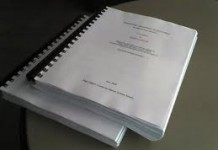A private graduate college in Vermont stepped in to save a writing program axed by the University of Southern California.
The Vermont College of Fine Arts offered to take over USC’s master’s of professional writing program after the California private university announcedit would end the program, citing a “business decision” amid an ongoing review of its Dornsife College of Letters, Arts and Sciences.
Thomas Christopher Greene, the Vermont college’s founding president, said he decided to try to save the 43-year-old program in part because his college and USC share faculty. While the program didn’t fit USC’s vision, it fit Greene’s.
In a statement, a spokeswoman for USC’s arts and sciences college said that Dean Steve Kay and other officials are working to make sure current writing program students can graduate, either at USC or from Vermont.
“He recognizes the excellent pedagogy of the MPW program, but has made this determination as a business decision,” said the spokeswoman, Emily Cavalcanti.
For the Vermont College of Fine Arts, the acquisition – for free – of USC’s program may be something of a coup, if it can capitalize on it.
“Essentially, it’s really an opportunity to create a residential program with some wind at its back,” Greene said. Continue reading “USC writing program heads for the hills”



